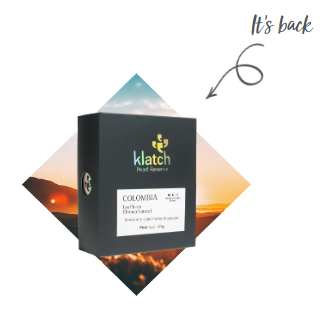
About this Coffee
We are thrilled to announce that Daniel, manager from Klatch Coffee Redondo, has won 3rd place overall in the highly competitive US Brewers Cup, held at the SCA expo in Portland, Oregon. This is a remarkable achievement, especially considering it was Daniel’s first time competing!
Daniel chose to showcase the exquisite Colombia Las Flores Chiroso Natural in the competition, and his skillful brewing techniques brought out its exceptional flavors to captivate the judges.
The Colombia Las Flores Chiroso Natural varietal of coffee boasts a unique and complex flavor profile that is sure to tantalize your taste buds. With notes of strawberry and kumquat, this coffee offers a sweet and fruity aroma that is both refreshing and invigorating.
The flavor is rich and prolonged, with floral notes of an elderflower finish that lingers on your palate. What makes this coffee truly special is its resemblance to the Geisha varietal, known for its exceptional quality and complex flavor profile. The Colombia Las Flores Chiroso Natural is a true gem among our coffee selectionand we can’t wait for you to try it.
Chiroso is a mutation of an Ethiopian Landrace originally found in Colombia in the province of Antioquia (Urrao). It is a rare variety to find, which stands out both in the appearance of elongated beans as well as it sensory traits.
We can refer to Chiroso as our domesticated Geisha. (Chiroso comes from that slang word ‘Chiro’ which refers to an old and stretched t-shirt.) Careful selection of ripe cherries with 24-26 degree brix. 48 hour oxidation in plastic drums. 50 degree thermal shock before sealing the plastic drums for a anaerobic fermentation process. Saccharomyces Cerevisiae obtain from the coffee cherries are added in a 1:5 ratio at 35 degree temperature for 80 hours. Subsequent 15 day control atmosphere is followed to obtain the ideal cup profile for this varietal.
The Flores farm began in 1990 with a mother who looked after 18,000 coffee trees. Each year they continued to grow until they reached 90,000 coffee trees. In 2006 they participated in the Cup of Excellence. From that moment they began their journey in the world of specialty and differentiated coffees. It was several years of testing, learning and a lot of experience, mainly it took time to identify what profiles coffees had and how they could be improved.
The Vergara family worked together, with their son’s guidance Johan Manuel Vergara Ayure, they began to adjust production and improve the post-harvest processes. Today they have varieties such as: Pink Bourbon, Tabi, Java, Maracaturra. In addition, they have implemented fermentation processes in exotic varieties such as Wush Wush and Bourbon Cidra.
History of Colombian Coffee As with many coffee origins, it is believed that coffee was first brought to Colombia by priests, arriving, perhaps, within a decade or two after coffee first came to the Americas via the Caribbean in the first half of the 17th century. It was likely a garden crop grown for local consumption and barter for decades. Generations of Colombians tell the story of a priest named Francisco Romero, who could be called the father of commercial coffee cultivation in Colombia. The folkloric tale goes that in the early 1800’s, Father Francisco, hearing confessions in the north eastern town of Salazar de la Palmas, assigned planting coffee to his parishioners as penance for their sins. The Archbishop of Colombia heard about this and ordered all priests to adopt the practice.
Commercial production of coffee expanded quickly, moving into regions where the growing conditions were ideal.
Growing Coffee in Colombia Even though it’s been 4,000 years, the soil resulting from the last major eruption of Tolima is still considered “young soil,” filled with nutrients that are no longer found at the same levels in old soil. Volcanic soil contains high levels of potassium and nitrogen, which are fading or absent in other soils. “Boron”, which arrived from outer space long ago, is also present. Boron plays a key role in a diverse range of plant functions: it is essential to the structure of plant cell walls and in the creation of enzymes, and in flowering and fruit formation, meaning that Boron contributes to coffee seed yield.
In addition to nutrients, the structure of volcanic soil is also beneficial to coffee growing. It can soak up and hold moisture while, at the same time, facilitating good drainage so that the water doesn’t pool, which is not good for coffee plant roots. Coffee plants like to take a drink, then take a break. Additionally, volcanic soils are usually found on an incline, which also helps with drainage. All of these “microclimate” factors come together to bring you the complex, nuanced flavors in your cup of coffee.